Tariffs imposed by the Trump administration collected an estimated $958 million in revenue from selected agricultural inputs from February to October of 2025, according to North Dakota State University's monthly…
Insurers Resume Black Sea Grain Cargo Coverage After Russia Rejoins Accord, While Mississippi River Woes in Focus
Ivan Nechepurenko and Matthew Mpoke Bigg reported in today’s New York Times that, “Russia on Wednesday rejoined an agreement allowing the shipment of Ukrainian grain through the Black Sea, one of the few areas of cooperation amid the war in Ukraine, easing uncertainty over the fate of a deal seen as crucial to preventing famine in other parts of the world.
“Moscow had suspended its participation in the deal over the weekend after an attack on Russian warships in the Black Sea port of Sevastopol that it blamed on Ukraine — though the attack was far from the corridor used by grain ships. It was unclear why the Kremlin reversed course so quickly, but President Vladimir V. Putin said in televised remarks that the agreement was tied to Ukraine’s ensuring the safety of Russian vessels.
“‘Russia retains the right to leave these agreements if these guarantees from Ukraine are violated,’ he said.”
#Russia has resumed participation in the crucial #BlackSeaGrainInitiative on #Ukraine food exports - a move warmly welcomed by @UN chief Antonio Guterres +
— UN News (@UN_News_Centre) November 2, 2022
UN Coordinator for the deal @AmirMAbdullahttps://t.co/rbR7cKKxYh
Today’s article noted that, “But Ukrainian officials suggested that Russia had reconsidered after seeing that other parties, including Turkey and the United Nations, were committed to continuing with or without Moscow’s involvement.
“Tatiana Stanovaya, an analyst of Kremlin politics, said that in trying to suspend the agreement, Moscow had not counted on the other parties continuing without it.”
EU is grateful for role of @UN and Türkiye in Russia’s decision to return to the Black Sea Grain Initiative.
— Josep Borrell Fontelles (@JosepBorrellF) November 3, 2022
Food should never be used as a weapon of war.
Grain export is crucial to address global food crisis exacerbated by Russia.
Calling on all parties to renew Initiative.
Francesca Ebel and Zeynep Karatas reported in today’s Washington Post that, “Turkish President Recep Tayyip Erdogan said Wednesday that he had secured Moscow’s commitment to resurrect a deal safeguarding Ukrainian grain shipments, one that has been crucial to sustaining food supplies to developing nations amid the Kremlin’s war in Ukraine.”
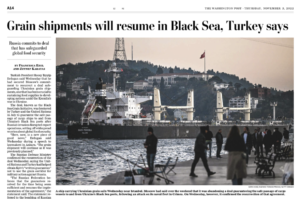
And Associated Press writers Andrew Meldrum and Suzan Fraser reported in today’s Los Angeles Times that, “U.N. humanitarian chief Martin Griffiths said Monday that 23% of the cargo exported from Ukraine under the grain deal went to lower- or lower-middle-income countries, which also received 49% of all wheat shipments.
“U.N. Secretary-General António Guterres hailed Russia’s announcement, and a spokesman said Guterres ‘remains committed to removing the remaining obstacles to the exports of Russian food and fertilizer.'”
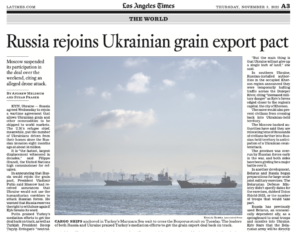
While Jared Malsin and Ann M. Simmons reported in today’s Wall Street Journal that, “After Russia said it was suspending its participation in the deal, ships continued to pull in and out of Ukraine, navigating through a maritime corridor established to safeguard the trade. The relatively smooth operation, despite Russia’s suspension, was taken by some critics as a sign Moscow is powerless to upset the trade.
“Among shipping and insurance executives, though, Russia’s suspension was threatening to dry up underwriting for voyages. Insurers were pulling policies and refusing to write new ones without Russia’s participation in the deal.”
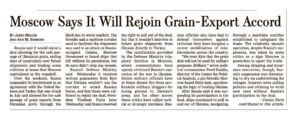
Reuters writers Carolyn Cohn and Jonathan Saul reported yesterday that, “Lloyd’s of London insurer Ascot is once again quoting on its cargo insurance facility for the Black Sea grain corridor, the facility’s lead underwriter said on Wednesday after Russia announced it would resume its participation in the accord.
“‘In response to today’s news, the Ascot-led ‘AsOne’ facility is quoting again, effective immediately, and we have already issued quotes this morning,’ Chris McGill told Reuters by email.”
“Two insurance industry sources said other underwriters had also resumed offering cargo cover for grains shipments, which had been temporarily paused this week,” the Reuters article said.
I had a call with my Turkish counterpart @MevlutCavusoglu. Building on the dialogue between the leaders of Ukraine @ZelenskyyUa and Türkiye @RTErdogan we coordinated further steps to ensure the functioning of the grain corridor and the release of Ukrainian prisoners.
— Dmytro Kuleba (@DmytroKuleba) November 2, 2022
Meanwhile, Bloomberg writers Aine Quinn and Firat Kozok reported yesterday that, “Russia agreed to resume a deal allowing safe passage of Ukrainian crop exports, abruptly reversing course after Turkey and the United Nations pushed ahead with the shipments over Moscow’s objections. Wheat prices dropped on the news.”
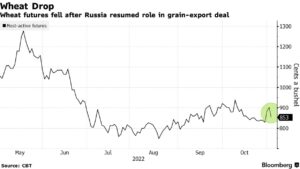
And Bloomberg writers Volodymyr Verbyany and Daryna Krasnolutska reported yesterday that, “Ukraine is optimistic the deal that has revived grain exports from its Black Sea ports will be extended beyond a mid-November deadline due to strong global demand, according to Deputy Infrastructure Minister Yuriy Vaskov.”
However, Dow Jones writer Kirk Maltais reported yesterday that, “Even with Russia opting back into the existing grain export corridor deal with Ukraine, whether or not Russia will extend the deal later this month remains unknown.”
Elsewhere, New York Times writer Rick Rojas reported today that, “On the Lower Mississippi — the portion that flows south from Cairo, Ill. — the water level in some places has fallen below records set more than 30 years ago. The conditions have hamstrung one of the nation’s busiest and most vital waterways and jeopardized drinking water systems. And experts have cautioned that the substantial rainfall needed to improve the situation could be weeks away, if not longer.”
“The river’s tremendous reach — linking soybean farms, chemical plants and food factories — has made it a crucial shipping lane for roughly 500 million tons of cargo each year, including a large portion of the world’s food supply. The dwindling water levels have not only choked barge traffic but forced the vessels to significantly lighten their loads. The cost of barge shipping has surged,” the Times article said.
And Financial Times writer Alexandra Scaggs reported today that, “It’s very good news that Ukraine’s grain shipments are resuming, because the US midwest is grappling with a drought. That has made parts of the Mississippi River too shallow for the normal pace of barge traffic transporting grain from the Illinois breadbasket to the Gulf Coast for export.
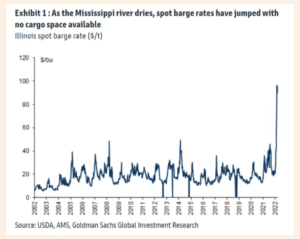
“Spot rates for river barges have soared to the highest level in decades, according to a note from Goldman Sachs.”





